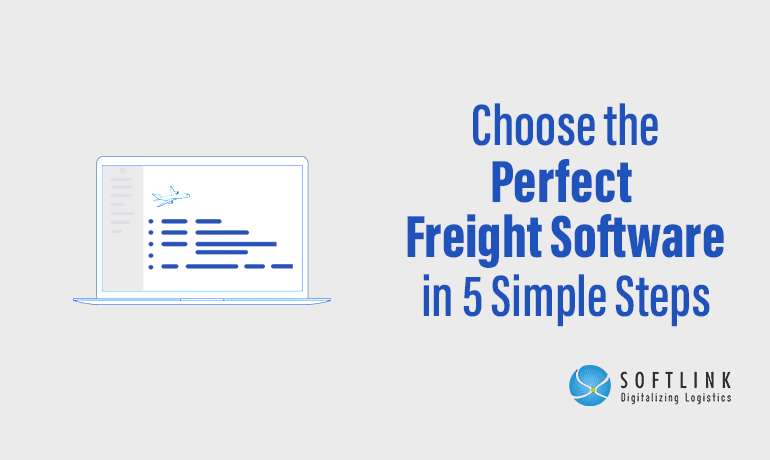- By Softlink Global
- August 3, 2022
- Freight Forwarder
“Whenever you see a successful business, someone once made a courageous decision.”
― Peter F. Drucker.
While decision-making can be tough, it is a major contributor to an organization’s sustained growth. Making the best decisions is never easy. And that’s also the reason why only a few companies find path-breaking success. Choosing the right software for any business is one of the crucial challenges faced by today’s decision makers. Considering the importance of technology in today’s logistics industry, choosing the right software has become more important, yet difficult for freight forwarders & logistics companies. So let’s see, what are the key criteria to select the right software which will lead to successful and sustainable growth?
Though they are extremely important criteria, freight forwarding and logistics companies today must look beyond just the features and functionalities of the freight logistics software. When every other available option provides similar features, then the idea becomes more evident to go beyond the direct benefits. The evaluation of the software for freight forwarders becomes easier if the below factors are taken into account.
Price vs Value
Freight forwarders tend to focus more on price while selecting the software. This approach of focusing entirely on price may create challenges in the longer run. Rather, freight forwarders must choose the most suitable software on basis of the value that software brings to the organization. The values can be anything from indirect benefits, such as ease of use, scalability and improved quality to measurable benefits like better cash flow, control of revenue leakage etc.
E.g., Software-A may be priced lower than Software-B. However, Software-B helps in substantially reducing per shipment cost as compared to Software-A. In such a scenario, Software-B is a better choice as it provides more value by increasing profitability and revenue.
Holistic Approach
While defining the criteria for the right software, freight forwarders must take a holistic approach. It is good practice to seek inputs from the entire team to understand the challenges at the various operational and tactical levels that impact productivity and efficiency. These inputs must be taken into account with consideration of benefits for the entire organization over individual functions. This approach helps in selecting the Logistics ERP Software that ensures better strategic fit and functional integration in the organization.
Learn more from our experts how you can digitalize your freight forwarding & logistics business.
Flexibility to adapt to changes easily and quickly
Logistics industry is extremely volatile, where changes occur rapidly and the inability to adapt to these changes has a diverse effect on business growth. Customer expectations keep growing with competitors providing better services and costs. In such an environment, a rigid software application becomes another hurdle while accommodating required changes. Freight forwarding software with a modular approach and plug-and-play capability makes adapting changes simpler and quicker. E.g. A logistics company can add the Warehouse module only after they start Warehouse Management System.
Vendor that understands your unique business
Let’s face the fact. A doctor can’t fix your car and every logistic software provider is not a logistics expert. We all have our own expertise and knowledge, acquired over the years, in this complex industry. It is very critical to select a vendor who understands the intricacies and challenges of your unique business offerings and can provide precise solutions. Domain expertise and experience of the vendor help in avoiding the challenges even before they arise in the system. Another important point is to evaluate the ability of the vendor to support the software and train the users.
The Indirect Benefits
Successful implementation of an effective freight forwarding software can have both direct and indirect benefits. Direct benefits include improved efficiency, improved decision making, quicker customer responses and many others.
The indirect benefits include a better corporate image, improved customer goodwill and customer satisfaction. Along with this, indirect benefits also help in improving the overall effectiveness of the business. Freight forwarding software helps logistics companies to save time and effort in data entry, enhance strategic planning capabilities and boost transparency and responsibility in a firm, which are equally important but less quantitative.
The effective utilization of software is an important factor in the success of freight forwarders. Hence, choosing the right software to automate and streamline business operations is immensely critical. If the above factors are considered in combination with features and functionalities, choosing the right Software for Freight Forwarder becomes much simpler and more effective.


